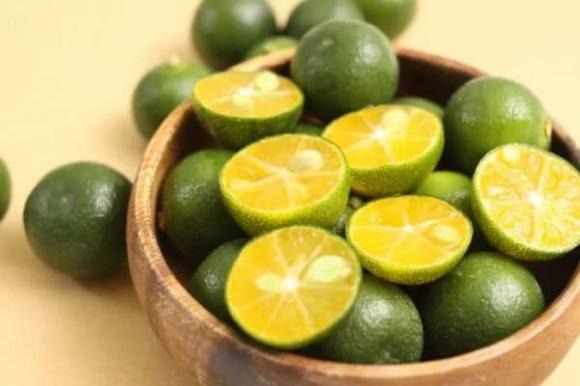Not only appearing regularly on the tray of five fruits, kumquat has become an important symbol in treating cough and cold in the winter when combined with rock sugar and honey.
In traditional Vietnamese New Year’s Day, the tray of five fruits is an indispensable part of every family, symbolizing the wish for a peaceful and prosperous new year. Each type of fruit on the tray carries its own symbolic meaning and is chosen to be suitable for that meaning. The fruits are usually chosen based on their names or colors which are symbolic of wealth, luck, health, and happiness.
In the northern region, kumquat is one of the essential fruits on the tray of five fruits, symbolizing luck and success. The bright yellow color of kumquat represents prosperity and good fortune for the family in the new year.

In addition to its decorative significance, kumquat also has many other uses. Also known as the orange, this fruit has a sweet and warm taste. With a high amount of vitamin C, vitamin A, and various nutrients such as riboflavin, choline, calcium, iron, magnesium, manganese, and zinc, kumquat brings many health benefits. In particular, it helps boost the immune system, aids digestion, and reduces symptoms of cough and cold.
According to Vietnamese herbalist Vu Quoc Trung from the Vietnam Traditional Medicine Association, the sweet and warm taste of kumquat helps treat cough due to wind-heat and digestive issues such as stomach pain, nausea, loss of appetite, and upper abdominal fullness. Kumquat is not only beautiful on the tray of five fruits but also a source of nutrition and has a health-supporting effect in the cold season.
Some cough remedies from kumquat
Here are some cough remedies from kumquat:
1. Soaking Kumquat with Rock Sugar to Treat Cough
Wash 5 – 7 kumquats, cut them in half and remove the seeds. Mix them with an appropriate amount of rock sugar, then steam them in a water bath for about 30 minutes. When the sugar is completely dissolved and the mixture turns into a syrup, stop cooking, let it cool, and use it gradually to treat cough. It can be combined with kumquat peel for better effect. Use 2-3 times a day, and the cough symptoms will quickly diminish. In the case of prolonged cough, increase the dosage to 3-4 times a day.

2. Cough Remedy Combining Kumquat and Honey
Take about 2/3 of the soaked kumquat quantity and mix it with honey. The cough will improve after two days of applying this remedy. Take about 5 fresh kumquats, wash them thoroughly and cut them into thin slices. Add a certain amount of honey and mix well with kumquat. Hold each slice of kumquat soaked in honey in your mouth for a while. When the kumquat loses its taste and becomes bitter, spit it out and hold about 2/3 of the soaked kumquat quantity. The cough will decrease after two days of applying the remedy.
Why Can Kumquat Effectively Treat Cough?
Kumquat has a cool and mild taste, not too harsh, which helps clean up phlegm and maintain the good functioning of the digestive system. The antioxidant compound proanthocyanidin in kumquat prevents the growth of bacteria and has a cough-relieving effect. In addition, kumquat is rich in vitamin C, which supports the immune system and helps fight infections. The essential oil in kumquat also has antibacterial properties, helping to soothe the throat, reduce inflammation and irritation, thereby reducing cough symptoms.
Note When Applying Soaking Kumquat with Rock Sugar, Honey to Treat Cough
































